Cat Advice FAQ
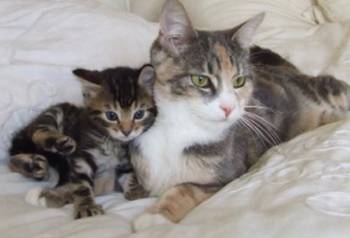
1. What to do when you find a stray cat
Feeding
Friendly strays
Nervous and Feral strays
Stray and feral cats with kittens
Cat breeding information
2. I can’t keep my cat – can you help?
Rehoming a cat
I can’t keep my rescued cat (from CHAT or other)
3. What can I do if I find a cat involved in a road accident?
4. What should I do about an injured cat?
6. Why is my cat being dirty in my house?
Medical reasons
Elderly cats
Behavioural causes
Solutions
Litter trays
Multi-cat homes and disputes between cats
Cleaning
When a solution cannot be found
7. We have a cat and are expecting a baby – should we be concerned?
Pregnancy, litter trays and hygiene
Children and cats
8. Cat allergies
9. Renting/ landlord/ tenancy issues
1. What to do when you find a stray cat
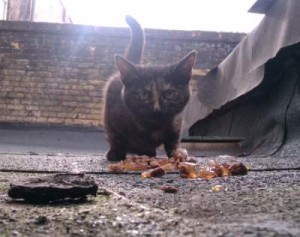 *What to do about stray cats is one of the main reasons you contact us.*
*What to do about stray cats is one of the main reasons you contact us.*
Stray mother cat living on a roof top, her kittens were hidden in a roof void.
Firstly you or we need to try and decide if a cat is actually stray. This is not always that easy to determine and some investigation will be required. If unsure please do contact us, we will ask you some questions and provide you with advice or come and take a look at the cat ourselves.
Initially you (or we) will need to make an assessment of the cat's general physical condition and behaviour to decide what course of action to take.
Is the cat thin? Is its coat dirty? Does it have wounds or injuries? Does the cat appear disorientated or distressed? Is it approaching numerous people in the street or mewing at various doors and windows? Is it generally hanging around – sleeping under cars or bushes at night? Or at your back door last thing at night and again first thing in the morning? Can you tell the sex of the cat? If female, does the cat appear to be pregnant – or feeding kittens? A pregnant cat's sides stick out (like a football in her tummy) – a cat who is feeding kittens will hang lower underneath and nipples may be obvious. However, it's not always that easy to tell, so please contact us asap if you are concerned that a stray cat could be pregnant or possibly feeding kittens.
SHOULD I FEED THE CAT?
If you are at all concerned that a cat is lost or stray then it is best to feed it – offer normal food rather than a tempting treat that any cat would want to eat. Offering food is another good way to get an indication if a cat may be lost – if the cat ravenously consumes the food as though it hasn't eaten for days then it's probably lost or stray.
*Advice is often repeated about not feeding potentially stray cats so as not to wrongly feed and encourage an owned cat – however it is better to mistakenly feed an owned cat than allow a cat genuinely in need to suffer.*
Feeding routine
If we consider that the cat you are concerned about is lost then we will ask you to feed it either to encourage the cat into a feeding routine so that it is easier for us to collect it – e.g. A nervous cat who may require trapping – or simply to ensure that the cat has food and water until we can assist or an owner is located or a more permanent solution is found.
Friendly strays
If a cat has turned up at your home and is friendly and you are able to temporarily care for it whilst seeking its owner then you should:
Ask! Enquire with neighbours if anyone knows who owns the cat.
Collar! If the cat is friendly enough make a paper collar with the message "Is this your cat? Please phone…" Put this on the cat for a few days, and if nobody calls you can assume the cat isn't going to and from its home. (You can use one of our telephone numbers if you prefer – please contact us in advance to discuss this.)
To make the collar use a strip of normal plain paper, place around the cat's neck and secure the ends with a small piece of sticky tape. Please don't use strong paper or shiny paper – the collar should easily tear apart if the cat gets caught on anything. Alternatively use a cat safety release collar with the message attached.
Check for a microchip! Get the cat scanned for an ID microchip. If you have access to a safe cat carrying basket to transport the cat in your local vet should do this free of charge. Alternatively contact CHAT or your local rescue centre to arrange for someone to visit and scan the cat.
Register! Please register the cat as found with your local cat rescue centres and vets.
Details of local animal charities can be found on www.catchat.org
Posters! Put up 'Found cat' posters – keep the cat's description general so that any potential owner has to give more specific details and distinguishing features and/or provide a photo.
Providing the cat a home
If, having taken reasonable steps to locate the cat's owner, you decide to give the cat a new home, please arrange a health check for the cat with your local vet and most importantly check that the cat is neutered!
If you live close to one of our London veterinary clinics and decide to give a home to a stray we can assist with the initial veterinary care at a minimal cost / donation or free. This includes neutering, microchipping, vaccinations, flea and worm treatment and a general health check for the cat to get you both off to a good start. After this time you will have to take over provision of veterinary care yourself, e.g. pet insurance, private vet, using our subsidised service or if eligible PDSA services.
Nervous and feral strays
IMPORTANT: Nervous and feral cats may require capturing to be neutered or taken in to be rehomed by CHAT using our specialist equipment. DO NOT try and capture nervous or feral cats yourself using either home-made devices or equipment purchased from the internet or elsewhere. A plan needs to be put in place first as to where any cats that are caught will be going and what will be happening with them. It is especially important that female cats who are feeding unweaned kittens are not caught and separated from their kittens. At CHAT our rescue teams have many years experience and are specialists in humanely working with feral cats – so please contact us to discuss first!
Please feed the cat(s) and watch and observe. If the cat is a lost pet who has become very frightened, by encouraging the cat with food and kindness they should increase in confidence again.
Register! You should report the cat as found to your local cat rescue organisations and vets in case anyone has reported a cat of that description as missing.
Details of local animal charities can be found on www.catchat.org
Posters! You can also put up Found posters – however, with a nervous cat if an owner is traced but the cat remains nervous help may still be required from CHAT or another charity to recapture the cat and return it safely to its home.
Microchip/ Lost cat collarIf the cat becomes more friendly it will be possible to scan for a microchip or put a paper collar on the cat.
Cats that remain nervous… If there are several cats that appear to be living as a group, or particularly if there are adult cats with kittens, then it is likely that the cats are a family of feral cats.

PHOTO: Stray and feral cats living at a garage. We neutered and returned these cats who are fed by the business owners who welcome their presence as rodent catchers.
Feral cats are cats that have been born outdoors to stray and abandoned pet cats. Because they have missed out on the early handling and socialisation with humans they grow up nervous of direct contact with humans. They can, if shown kindness, become more confident with people over time and kittens can be successfully tamed and domesticated.
Cats breed rapidly so the numbers of cats living in a feral colony can increase rapidly.
Feral cats require food, shelter, veterinary attention if unwell or injured and deserve to be treated kindly just like pet cats.
It is very important to contact CHAT (if you are local to any of our Branches) or your local cat rescue organisation to obtain help with neutering the cats to prevent their numbers continuing to increase.
We will ask you to help by feeding the cats. This may be temporarily until we can take them in or to assist us by attracting the cats to a feeding point or a longer term feeding arrangement if the cats are to be neutered and returned.
Ear tipping: Cats that are neutered and returned by CHAT are routinely 'ear tipped' – this means that the very top of the left ear is cut flat. This means of identifying feral cats as neutered is used in many countries around the world and enables you to see at a distance if the cat has been neutered. We also ID microchip feral cats at the time of neutering and register them either to ourselves or the feeder if they so wish.
Feral cats are a priority for us at CHAT. Feral cats can suffer great hardship and suffering in their lives. Neutering and taking care of a feral cat colony greatly improves the quality of their lives as well as preventing the births of many more litters.
A healthy colony of neutered feral cats will act as a highly effective rodent patrol, whether in a rural or urban setting.
Stray and feral cats with kittens
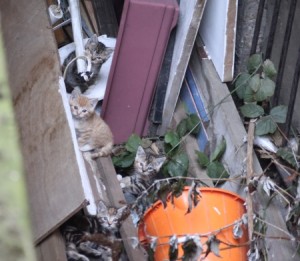 Stray kittens hiding amongst timber and other abandoned building materials
Stray kittens hiding amongst timber and other abandoned building materials
From Spring until late Autumn, stray and feral unneutered female cats will be either pregnant or raising a litter of kittens.
Mother cats usually hide their kittens very well and choose places such as in or under garden sheds, in dense undergrowth, and in or under discarded rubbish such as old furniture. They also like abandoned vehicles, or access cellars, loft spaces or empty buildings through small holes such as broken ventilation grills.
If you discover a cat with a litter of kittens it is best not to disturb them, as there is a risk that the mother cat will feel worried and decide to move her kittens to another hiding place.
Provide mum with some food nearby to reassure her that you mean her and her babies no harm and then contact CHAT for advice and assistance. If you are not local to any of our Branches please contact a local rescue organisation.
Details of animal charities all over the UK can be found on www.catchat.org
If the mother cat is friendly towards humans and her kittens are still very young we should be able to collect them and move them to the safety of a foster home or one of our rescue centres.
If the kittens are already mobile – walking and climbing around – unless they are unwanted pet kittens who have just been abandoned, then they will already be very nervous of actual human contact and will require safely capturing using our specialist equipment.
It is vital that we establish how many kittens there are in a litter so as to ensure that none are left behind. Feeding and observing the family for a few days will be required to find out how many kittens there are actually are.
Once in our care, our dedicated staff and volunteers spend time handling, gently playing with and socialising the kittens in order to tame and domesticate them.
BUSY! The Summer months of June, July and August are the height of the kitten season. During these months we are inundated with requests to assist with feral cats and kittens. In some areas, particularly in East London, there is a huge stray and feral cat population. A combination of issues – including deprivation, but also religious and cultural ideas regarding neutering and the purpose and status of cats in people's homes and community – have all resulted in very large numbers of cats in need of assistance in this area.
At this time of year we do our best but can struggle to keep up with the requests for help that keep coming in. We prioritise helping those who are sick or injured or in dangerous locations. We do our very best to catch up with any feral colony neutering that is outstanding in the relatively quieter winter months.
At these busy times if you can provide any additional help, e.g. taking in and temporarily fostering a stray mother cat and her kittens so that the kittens grow up well handled and therefore more homeable, please let us know. We can loan a temporary cage to contain kittens in, and can provide neutering for mum and veterinary treatments such as flea and worm treatments.
Cat breeding information
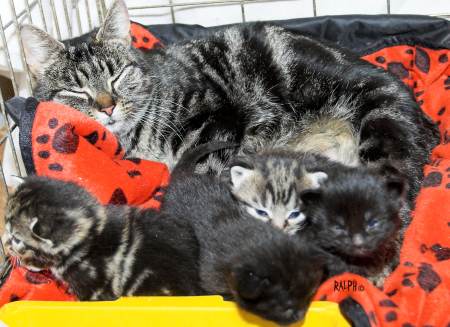 Cats are seasonal breeders, typically giving birth to two litters a year (but sometimes three) in Spring and mid – late Summer.
Cats are seasonal breeders, typically giving birth to two litters a year (but sometimes three) in Spring and mid – late Summer.
The cat mating season begins in earnest in January and February when unneutered female cats come in to season ("on heat"). They are soon mated by numerous unneutered male cats.
They are pregnant for 9 weeks.
A litter of kittens usually contains between 2 and 6 kittens.
Kittens are born with their eyes closed and initially reliant on their mother's milk. Kittens' eyes open at around 10 days old. Kittens start to eat solid food between 4 and 6 weeks, but will also continue to be nourished with their mother's milk during this time.
Mother cats usually come back into season again and therefore can become pregnant again when their kittens are 6 weeks old, BUT some cats come back into season again within 2 weeks of giving birth.
Mother cats give birth to second litters in the summer, and some can give birth a third time in the same year.
Kittens themselves are capable of breeding from 4 months old.
2. I can't keep my cat – can you help?
Everyday we receive calls about owned cats which need new homes for a variety of reasons. Unfortunately, as much as we would like to be able to help everyone, it just isn't possible for us to take in every cat that we are asked to help with – it also wouldn't always be in the best interests of the cat for us to do so.
Where possible we will provide advice to help you to continue to care for your cat – this could be behavioural or health care advice or assistance.
If you need to rehome your cat because of a change in your personal circumstances, e.g. moving to somewhere that doesn't allow pets or change in working hours etc, then we will advise you how you can seek a suitable new home for your cat yourself. It will be better for your cat to be rehomed directly from you to a new home without a potentially stressful stay in a rescue centre in the middle.
- Try family, friends, neighbours and work colleagues – you will probably feel happier homing your cat with someone that you know anyway.
- Advertise for a home via your local vet's waiting room. Visit any offer of a home and ensure you feel happy and reassured before leaving your cat with them.
Make sure a new owner knows that your cat must be kept completely indoors for the first month before being allowed access to outdoors to ensure that he/she is well settled.
*Never advertise your cat via online sites such as Gumtree or Preloved. You do not know who you are really giving your cat to and they could end up at worst as bait for dog fighting.*
We may be able to assist by advertising your cat as being in need of a new home on our website. In which case, if we receive a suitable offer of a home we would carry out a pre-adoption home assessment to provide the potential new owner with any advice they require about settling in or caring for a new cat and to assess suitability.
If your request is high priority, e.g. imminent eviction, death of owner and no one to care for the cat, we will do our very best to accommodate the cat or alternatively suggest other sources of help.
I can't keep my rescued cat (from CHAT or other)
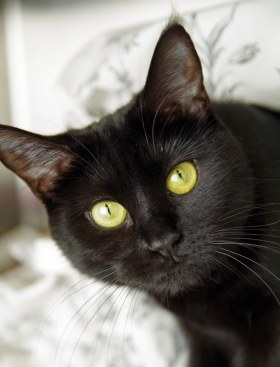 CHAT CATS
CHAT CATS
If you originally adopted your cat from CHAT then they must be returned to us or rehomed with our agreement. Adoption agreement condition no.1: "Not to part with possession of the animal(s) except to return it/ them to CHAT by prior arrangement, if for any reason I am unable to keep it/ them. Animals homed together must be returned together unless CHAT agrees otherwise."
If we are given some notice of the need to rehome the cats, we can attempt to rehome cats directly from you to a new home by advertising them on our website – this is preferable to just readmitting them since it is less stressful and disruptive to the cats.
OTHER RESCUED CATS
If you adopted your cat from another animal charity please contact them first – it is standard practice for animal charities to insist on taking cats back again that they have previously homed.
3. What can I do if find a cat involved in a road accident?
If you find a cat that has been involved in a road accident and is still alive then the priority is to obtain veterinary care asap.
Advice on what to do will differ depending on where you are, what you can put the cat in, if you have transport, how mobile the cat is, etc.
If the cat is still lying in the road you will need to carefully move the cat out of the road to prevent further injury. Try and enlist the help of any passers-by who may be able to knock on any immediate doors to try and locate an owner or obtain more help whilst you stay with the cat.
Your options are:
If you are near a vets to take the cat there. If a passer-by or local resident will assist you then it may be possible to borrow a cat carrying basket from the vets or a neighbouring house to move the cat in. The vets should provide emergency treatment at no cost before passing the cat on to a local animal charity to continue treatment and await hopefully being reunited with an owner.
Phone CHAT, another local animal charity, or the RSPCA (contact details of other local animal charities can be found on www.catchat.org – wait with the cat until help arrives)
4. What should I do about an injured cat?
If a cat is injured has wounds or looks unwell please contact your local branch of CHAT or your local animal charity. Contact details of other local animal charities can be found on www.catchat.org
In the Summer months particular concern should be paid to cats with wounds, as flies can lay eggs on infected wounds which quickly hatch into maggots. Obtain help immediately in flies are buzzing around a sickly or wounded cat.
5. An unneutered male cat (tom cat) keeps coming through my cat's cat flap, stealing food and spraying. What can I do?
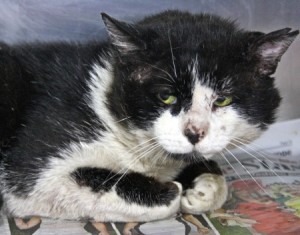 A common problem! Although this cat is causing a lot of upset for you and your cat please do feel sorry for him.
A common problem! Although this cat is causing a lot of upset for you and your cat please do feel sorry for him.
He is probably a stray – what typically happens is that someone had him as a kitten but they didn't get him neutered, as he got older and reached sexual maturity he became less interested in being a homely pet and instead began to roam further afield in search of female cats or to take part in territory battles with other unneutered male cats. Eventually he lost his way and he now has to survive by scavenging and stealing food where he can.
As an unneutered male he will be a worry to, and possibly aggressive to, your own neutered cat and his urine marking will be offensive.
He needs neutering – once neutered his hormones will settle down and he will cease being aggressive towards other cats and will stop spraying.
If he seems to be a stray we can neuter him – we can help capture him if he is nervous and we will then, neuter, microchip, vaccinate, de flea and worm him and treat any ailments.
We will need to discuss with you if you are happy for him to be returned – bear in mind that he will soon become a handsome, well mannered and domesticated cat, and he will require feeding regularly. Alternatively, it may be decided that we need to try to find him a new home.
If there is a possible owner we are happy to approach them (without disclosing who contacted us) to discuss getting him neutered. Unneutered male cats don't spray in their own homes and his owners will probably be completely unaware of the havoc their cat is causing in the local area. We can arrange free neutering if need be and also assist with transporting him to be neutered if required.
6. Why is my cat being dirty in my house?
Cats are normally very clean provided that they have access to a garden via a cat flap and/or have a litter tray.
There are a number of reasons that can cause or lead to a cat urinating or defecating in the wrong places in your home.
Firstly, it is important to find out or rule out a medical reason, i.e. is your cat unwell?
URINE INFECTION: Your cat may have a urine infection (cystitis) which is causing him or her to feel the urge to urinate frequently. Cats with cystitis will squat and attempt to pass or pass a small amount of urine which may be slightly blood tinged. A cat with cystitis may try to do this several times an hour and they often have a preference for soft surfaces such as duvets, sofas, cushions and carpets. Cystitis is very painful and your cat will probably seem uncomfortable and may be quiet, a bit withdrawn or moody.
If your cat is showing symptoms of cystitis you should seek veterinary attention as you cat will probably require medication and pain relief.
Cystitis can occur as a one off occurrence and once treated your cat will cease urinating inappropriately. If the cystitis continues to recur the cause will need to be investigated and could be caused by the presence of Urinary crystals.
URINARY CRYSTALS: Crystals can form in the urine and then irritate the bladder wall and cause inflammation and symptoms of cystitis. Urinary crystals can cause a blockage so that the cat cannot urinate at all – this is an emergency as a total blockage will be fatal if not treated as soon as possible.
Partial blockage and long term irritation can be a cause of cats urinating in the wrong places over a longer period of time as opposed to a sudden bout of painful cystitis.
Treatment is usually to feed your cat on a special veterinary prescription food to prevent crystals from forming in the cat's urine.
DIABETES: Cats can develop diabetes, symptoms include increased thirst and urination, and this can be exhibited as urinating in the wrong places, e.g. corner or rooms, work tops.
A simple glucose test can be carried out either by testing your cat's urine for traces of glucose or via a blood test. A cat with diabetes requires treatment for his or her condition but once the disease is under control should stop urinating in the wrong places.
KIDNEY / RENAL PROBLEMS: Cats with kidney disease drink more and urinate more and may urinate in the wrong place. Any cat with increased thirst and urination needs veterinary attention to check for kidney problems or diabetes.
Frail elderly cats are best provided with an indoor litter tray so that they do not have to struggle to go outside.
Elderly animals can have accidents from time to time and a responsible pet owner should be understanding and treat their pet with kindness when this occurs.
If you are struggling to cope with an elderly cat being dirty please seek veterinary advice or contact us for support.
Defecating
Defecating in the wrong place is less common than inappropriate urinating. If you cat has loose stools or diarrhoea it may simply be a case that they cannot make it to the garden or litter tray in time.
If your otherwise healthy adult cat develops an upset stomach, provide a litter tray and feed a bland diet, e.g. boiled chicken or in mild cases just dry food for a couple of days until your cat has recovered. If the problem persists or you cat has other symptoms, e.g. lethargy or vomiting, you should seek veterinary advice. Kittens are more vulnerable when unwell so veterinary advice should be promptly sought.
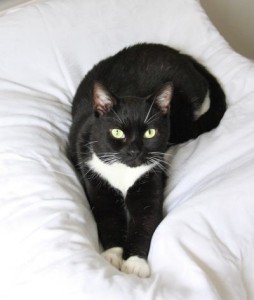 Once you have established that there isn't a medical cause for your cat being dirty then you need to look at the problem as a behavioural one and to try and establish and resolve the cause.
Once you have established that there isn't a medical cause for your cat being dirty then you need to look at the problem as a behavioural one and to try and establish and resolve the cause.
Cats that are suffering stress or an upset in their lives unfortunately tend to show their distress by urinating and occasionally defecating in the wrong place.
Neutered male cats can start to spray (urine mark) within your home, males and females may squat and urinate on soft furnishings or in corners of rooms.
Typical causes include: A new and territorial cat in the neighbourhood, a new baby in the home, a new pet, not getting on with another cat in the home, house move, divorce, relationship breakdown, arguments within the home, new partner, building work, redecorating, new furniture. If you cat suddenly starts being dirty try and think if there have been any changes within your home or with your cat's outdoor territory in the last few weeks.
Often your cat will settle down again and the problem will cease, but for some cats a pattern starts to be established and your cat gets used to urinating or defecating in the wrong place.
If you can resolve the cause of the problem then you should do so. *It is really important that you do not get upset or angry with your cat as this will only add to your cats stress and make the matter worse.*
'New cat on the block'
This is a common cause of problems. Usually the cat causing the problem is an unneutered male – often stray but some are owned, they are territorial and will fight with other cats and also mark the area with strong smelling urine. The solution to this problem is to get him neutered, once neutered his hormones will settle down, and after two weeks he will no longer want to fight and will cease urine marking his territory.
We can help with neutering him – for owned cats we can go and speak to the owner; they will probably be unaware of the havoc their cat is causing in the local area and we can offer help with neutering and even transporting him to be neutered if required.
For strays, including those who are nervous or feral, we can assist with capturing and neutering and will discuss with you either returning him or rehoming on an individual case basis.
Once this cat is neutered your cat will gradually relax again and cease being dirty.
In a very small number of cases the aggressive cat is a neutered pet cat belonging to a neighbour – this is harder to resolve but please do contact us for any advice we can offer.
Family disputes, upset and bereavement
Cats are sensitive animals and do pick up on human emotions within their home.
Try and avoid arguments when your cat is present and try and spend some quiet, quality time with your cat stroking or playing with them and providing them with reassurance that you still love them.
New Baby
 A new baby is a time of major change, but don't forget your cat – make a effort to give your cat some extra attention and let them see your new baby. Remember that your cat is a member of the family and wants to know what's happening as well, rather than finding themselves excluded from the room every time the baby is there.
A new baby is a time of major change, but don't forget your cat – make a effort to give your cat some extra attention and let them see your new baby. Remember that your cat is a member of the family and wants to know what's happening as well, rather than finding themselves excluded from the room every time the baby is there.
Building work and home improvements, moving house
Cats don't generally cope well with loud noises (such as hammering) or strange smells (such as paint) or the presence of builders in their home.
For short term, small projects confine your cat to one room with a litter tray at the furthest point in your home from the source of the noise.
For larger, lengthier projects it may be better to consider placing your cats in the safety of a boarding cattery or have them stay at a friend's or relative's home (kept entirely indoors though so that they don't go missing)
Try and keep moving house as stress free for your cat as possible. Keep your cat confined to one room on moving day and place him or her in one quiet room upon arrival at your new home.
Multi-cat homes and disputes between cats
Rather like upsets that can occur between people living under one roof, cats sharing a home do have disagreements from time to time. A problem occurs if one cat becomes consistently dominant and starts to bully another cat. In this situation either cat may begin urinating inappropriately. See below for some suggested solutions to the problem.
Apart from neutering that new cat in the area, most other causes are ones that your cat needs to try and adjust to and accept in their lives, including living with other cats in the household.
Feliway
At this point we need to tell you about a product called Feliway – if you haven't come across it already! (www.feliway.com)
Feliway is an artificial pheromone which mimics the feline facial pheromone, used by cats to mark their territory as safe and secure.
It comes as a plug in diffuser, rather like a plug in air freshener, or in a spray form. (We have found the Feliway diffuser to be the most effective).
Feliway helps to make your cat feel more relaxed – we have found Feliway to be very effective when cats are feeling stressed and being dirty.
We do recommend that you try using Feliway as part of trying to resolve your cat's particular problem.
It can take up to three weeks to start seeing a real effect, but our staff and volunteers have used Feliway in their own homes and have seen really benefits in reducing problem behaviour, such as urine spraying and disputes between their own cats.
We know that some of you are not keen on litter trays in your home – but if comes to a choice between cats urine on the carpet and changing a litter tray, which is preferable?
If your cat is scared to go outside to use the garden because of an aggressive cat that is outside then you will have to provide an indoor litter tray – cats don't like being dirty, and it will only add to your cats distress if they feel that they have to end up toileting inside your house.
If your cat persistently urinates or defecates in the same spot, try putting the litter tray in that place. You can then gradually move the litter tray if it is an inconvenient location once the cat has got used to using the tray. It is essential that relocating the litter tray also coincides with a thorough cleaning of the area to remove any trace of urine as if your cat can smell urine they will return to that spot.
Keep the cat litter tray clean – Some cats will only use a tray once and others don't like to share. If you have more than one cat they may require a litter tray each and if you have one cat that won't use a tray more than once you may need two trays for that one cat. Litter trays should be cleaned at least once a day.
Litter types – There are a variety of types of cat litter on the market: grit types, wooden pellets, crystals etc. Some cats prefer different litters, so if you have a litter tray and your cat isn't using it try different types of litter to see if it makes a difference.
In our rescue centres we tend to find that cats who are not keen on using litter trays often prefer the grit type litters.
Multi cat homes and disputes between cats
We have found Feliway (see above) to be very helpful in these situations, making both cats feel more relaxed and less like to show aggression toward each other. Some people also find Bach Flower remedies to be very helpful.
Cats that have previously lived harmoniously together for years can be upset by situations such as:
A trip to the vet – whereby one cat returns smelling different
One cat being involved in a cat fight outdoors and returning home smelling different
The presence of an aggressive local cat can cause fighting between your own cats
In these situations the cats are almost viewing each other as strangers, but we have been able to help with reintroductions – sometimes by confining one cat to a 'kitten pen' (a wire mesh cat cage that has space for a bed, litter tray and food bowls) for a few days so that the cats can see each other and get used to each other but not actually get at each other. After a few days it has usually been possible to reintroduce them to each other without further problems.
We are happy to discuss and advise about individual cases.
Once a cat starts to urinate in a particular place they tend to keep returning to that same spot. Thorough cleaning to remove rather than just to attempt to mask the smell is required to try and break the pattern of using that particular place.
Some cleaning products however make the situation worse because they contain ammonia (an ingredient of urine) – avoid products such as bleach which actually make the problem worse. Some household disinfectant products are dangerous to cats.
We recommend a simple solution of biological washing powder (the stuff you put in your washing machine) and warm water. The enzymes in biological washing powder break down the protein in the cats urine. Wash the affected area as thoroughly as you can, pat it dry and then allow to naturally dry. Keep your cat away from the area or item whilst it's drying.
If the affected area is a floor area such as the corner of a room, and is not somewhere that you want to position a litter tray, once cleaned and dried try to block your cats access to that point – you could place a solid item of furniture there such as a cupboard, or if that is not practical such as in a hallway place a sheet of tin foil (cats don't like walking on foil).
Make sure a litter tray is provided somewhere else, and that you have shown your cat where it is.
If your cat has urinated on items such as duvets and sofas, wash and clean them as best you can with biological washing powder solution, and then you will have to shut your cat out of that room for at least two weeks to attempt to break the pattern of returning there to urinate.
A happy cat again… A combination of thorough cleaning, reassurance and helping your cat feeling more relaxed through the use of a product such as Feliway will hopefully overcome a behavioural cause over a matter of weeks.
When a solution cannot be found
Despite everyone's best efforts, sometimes the problem cannot be resolved and your cat cannot be made happy again.
The most common situations include when two or more cats in a household just cannot get on with each other, or where a cat is very upset by the arrival of a new baby and cannot get used to the new situation.
Sometimes it is better to find a new home for the unhappy cat where they will not have to endure the stress of being bullied by another cat or be so unhappy because of a noisy baby or boisterous toddler.
*Thank you for reading this section – if your question remains unanswered or you require further advice please do contact us.*
NB. It is a policy of the Celia Hammond Animal Trust that cats originally adopted from us should be returned to us for rehoming if you can no longer keep them – this is a condition of adoption. Most other animal charities also have this policy.
7. We have a cat and are expecting a baby – should we be concerned?
The answer is No! But sadly many people decide that they don't want to keep their cat when a human baby comes along. Thousands of cats end up in rescue centres for this reason every year.
Many new parents worry about how their pets and a new baby will get along, and for the vast majority of people and cats there really isn't a problem.hapendjet
Occasionally cats get very upset and unhappy when a baby arrives – it is a time of change for the cat and the new parents. It is important to acknowledge that the cat may feel unsettled and to give them a bit of extra attention, but most cats adjust to the new arrival very quickly.
The cat soon realises that although a newborn baby may be noisy it is not mobile and cannot pursue the cat.
From a safety point of view the only requirement is not to allow the cat unattended access into the room where the baby is sleeping or leave the baby and cat unattended together. Using a baby monitor in the room where a baby is sleeping allows the baby to be heard even if the door is closed to keep a cat out.
Remember though that your cat is a member of your family and wants to know what is happening and feel included in meeting and getting to know your new arrival.
It is generally accepted and studies have shown that it is good for children to grow up with pets and to learn how to treat and respect them; some studies have shown that a first child who grows up with a cat and learns how to treat the cat kindly will then be gentler towards a sibling should one come along.
Sadly many cats are given up by owners who are concerned about possible risks of a cat hurting a baby or hygiene risks and then regret it, and two years later seek to take on another cat – at which time it is much harder to introduce a cat or kitten into a home with a curious and excited toddler.
We are aware that the advice given by individual health professionals varies greatly and often is based on their own values.
In our experience it seems to us that some health visitors in London are very anti pets and do tend to overstate the risks which really are minimal provided common sense is used. Outside of London health visitors are generally far more relaxed about pets.
Occasionally a cat doesn't adjust well to a new baby and becomes very unhappy – even showing signs of distress such as urinating in the wrong places. Don't be in a hurry to give up, but if he or she does not settle down after a reasonable time (at least a few weeks) then in such an instance it may be fairer on your cat to seek a new home.
Pregnancy, litter trays and hygiene
 One of the most common reasons people give for wanting to give up a pet cat is pregnancy and the fear of being infected with toxoplasmosis from contaminated faeces. Toxoplasmosis is a parasitic infection that isn't serious for you but can pose a danger to a developing baby.
One of the most common reasons people give for wanting to give up a pet cat is pregnancy and the fear of being infected with toxoplasmosis from contaminated faeces. Toxoplasmosis is a parasitic infection that isn't serious for you but can pose a danger to a developing baby.
The national cat charity Cats Protection says: "Cats Protection would like to point out that statistically a cat owner is no more or less likely to contract Toxoplasma gondii than a non-cat owner.
While cats are the definitive host for T. gondii, research has shown that contact with cats is not a risk factor for infection and even vets are no more likely to be infected with the parasite than non-vets. Most people contract Toxoplasmosis through other routes such as eating undercooked meat, inadvertently ingesting contaminated soil through gardening or eating unwashed vegetables.
It is already known that Toxoplasma is common in people (for example around 80% of people in France and Germany and up to around 33% of Britons have been infected at some point in their lives) but it's important to note that serious effects are extremely rare. To reduce the risk of infection especially important for those in higher risk groups, both cat owners and non-cat owners can take sensible precautions, such as practising good food hygiene, wearing gloves when gardening and cleaning out litter trays."
Cats Protection are "extremely concerned that putting the emphasis on felines may discourage people from adopting a cat or encourage cat owners to unnecessarily give up their pets. Let us also not forget the many benefits and enrichment that cats bring to the lives of their owners."
Beth Skillings, Clinical Veterinary Office for Cats Protection"
http://www.cats.org.uk/news/keep-calm-and-keep-your-cats
Information from NHS Choices http://www.nhs.uk/chq/pages/1107.aspx?CategoryID=54#close The risk of getting toxoplasmosis when you are pregnant is very low. One study suggests that, in the UK, about three in every 100,000 babies are born with congenital toxoplasmosis. Congenital means present from birth.
Toxoplasmosis infection is caused by a parasite called toxoplasma gondii. This parasite can be found in:
- Undercooked or raw meat
- Raw cured meat, such as salami or parma ham
- Unpasteurised goats' milk
- Cat faeces
- Soil or cat litter contaminated with infected cat faeces
- Sheep can also carry the toxoplasma parasite
Other studies (including http://www.bmj.com/content/321/7254/142 ) found that in pregnant women toxoplasmosis was usually caused by eating undercooked meat and cured meat. Less commonly, it was caused by contact with contaminated soil.
It's rare for a woman to be infected for the first time during pregnancy, and some experts argue that you're much more likely to catch it from eating raw, undercooked or cured meat than from your cat.
The risk of contracting toxoplasmosis during pregnancy is low, and if you've had it once, you can't catch it again. There is a blood test which can show whether you have had toxoplasmosis.
Wear gloves when you're gardening and handling soil or sand to cut down the risk of infection from cat and animal faeces. Always wash your hands before preparing or handling food and be very strict about food hygiene.
We believe that it is beneficial for children to grow up with pets whom they learn to treat with kindness and respect. It is up to parents to ensure that their children do treat pets kindly; babies and toddlers must be supervised at all times when near cats, it is not fair on your cats if they are handled roughly, and any cat that has its tail pulled or is manhandled by a toddler or young child can bite or scratch.
There should be areas within a home where cats can get away from young children – stair gates are a useful aid in achieving this, as well as a method of keeping the location of a cat litter tray separate from very young children. Even a shelf for a cat to sit on out of reach allows the cat its own safe space within your home. A cat flap also provides a cat with the freedom to come and go as he or she chooses.
8. Cat allergies
We receive numerous requests to rehome cats due to possible allergy, either that of the caller or more often because there is concern that a child could be allergic.
People with a cat allergy are allergic to proteins in the cat's saliva and dander (dried flakes of skin) – it's not actually the cat's fur that causes the problem.
Symptoms of cat allergies can include: coughing and wheezing, hives or a rash on the chest and face, red, itchy eyes, redness of the skin where a cat has scratched, bitten, or licked you, runny, itchy, stuffy nose and sneezing.
However these symptoms can also have other causes other than your cat, and it is important not to immediately blame your cat and seek to rehome him or her.
We have carried out a detailed analysis of the requests that we receive at our Canning Town Branch to rehome cats. Requests to rehome cats due to "allergies" noticeably increase during the Summer months – coincidentally this coincides with the hay fever season when many people experience a reaction to increased pollen levels.
Many cat owners who suspect that their cat is the cause of mild and manageable allergic symptoms continue to share their lives together.
More severe allergic reactions can be miserable. In such a case please visit your GP who can arrange allergy testing for a range of possible causes.
If your cat is found to be a cause of yours your child's allergies it is then worth trying to arrange for a friend or relative to care for your cat for a few weeks to see whether the symptoms alleviate before making the decision to seek a new home for your cat.
Advice for those with mild allergies or who want to try and find ways to continue living together:
Don't let your cat sleep on the bed of the person with the allergy and preferably keep the cat out of their bedroom.
Sweep and mop floors and vacuum regularly. Use a Vacuum cleaner with an allergen-proof vacuum cleaner bag or with a high efficiency 'HEPA' filter. Replace carpets with hard floor surfaces.
Use throws on sofas and change and wash regularly.
Antihistamine medications such as those used for hayfever will bring relief.
Air purifiers are electrical units which filter the air in your home removing particles of allergens.
Ventilate your home with fresh air every day (but be careful not to leave upstairs windows wide open if cats have access to them and could fall out!)
Consider a course of immunotherapy treatment. Over time, injections containing extracts of the allergen gradually increase tolerance to the source of the allergen.
Petalcleanse is a product that can be bought online and from chemists and vets. It is a lotion containing cleansers which gently remove the dander, saliva and urine from the coat, and encapsulate the allergen Fel d1. Moisturisers in the lotion condition the coat and skin to further reduce the amount of material shed. *Many people highly recommend Petal Cleanse and it is well worth giving this product a try.*
9. Renting/ landlord/ tenancy issues
A huge number of cases that we are contacted about are problems with pets not being allowed in their owner's accommodation (11% of calls to our Canning Town Branch in 2012).
When initially acquiring a pet it is essential to ensure that permission has been obtained and also to bear in mind future moves. A pet is for life and extra effort needs to be put in to secure suitable accommodation that will allow pets if you move to another rented home.
Private landlords
Many agencies have blanket 'no pets' rules but there are individual landlords who allow pets. If seeking rented property through an agent, request that the owner of a property is contacted to enquire if pets would be allowed. An additional deposit to cover potential damage may be all that is required.
Local authority / Housing Associations
Recently there has been a trend towards introducing either no pets or restricted rules regarding species of pet and numbers kept. This usually does not apply to existing pets but there have been a number of cases where we have negotiated on an owner's behalf – provided of course that all your pets are well cared for and neutered.
Hopefully, with an increase in people needing to rent, landlords will realise that being 'pet friendly' will help attract tenants.
Sites such as http://petfriendlyproperties.org.uk are new, but hopefully this idea will continue to spread nationwide.
10. I am concerned about the welfare of a neighbours cats (neglected/breeding) – what can I do? / I have too many cats – can you help?
*Whether you are concerned for a neighbour or friend or you yourself have found yourself with too many cats, please do contact us – we are here to help!*
Our approach is to try and work sympathetically with owners to assist and support them with caring for their pets. Often situations have arisen out of a lack of knowledge about how to care for their pets properly, and this may have led to neglect rather than deliberate cruelty. Or the cats owner may have experienced difficulties in their lives such as redundancy, death of a partner, physical or mental illness that have led to the situation. Cats breed extremely quickly and owners can get caught out by this.
We are friendly and non-authoritarian, with the aim of building a long-lasting, positive working relationship between ourselves and the owner of the cats.
We can act confidentially and do not need to reveal the identity of the person who reported their concerns to us. Where there is a welfare concern it is often the case that any one of a number of people could have been aware, and therefore no single person would be identifiable.
We are not easily shocked – we have seen it all many times before and are used to regularly assisting people who have 20-30 cats but also those with 50/60/70 or even 80 or more cats. Please do not be embarrassed or worried about seeking our help.
We can offer help with neutering and microchipping (free if need be), transporting cats to ourselves for neutering and back home again. We can also offer help with veterinary treatment, health care and general advice, as well as rehoming of cats and kittens if necessary.
We find that the vast majority of people are very appreciative of our assistance.
We routinely liaise between cat owners and housing authorities to reach a satisfactory solution whereby owners who want to keep their pets can do so provided that are neutered and well cared for.
